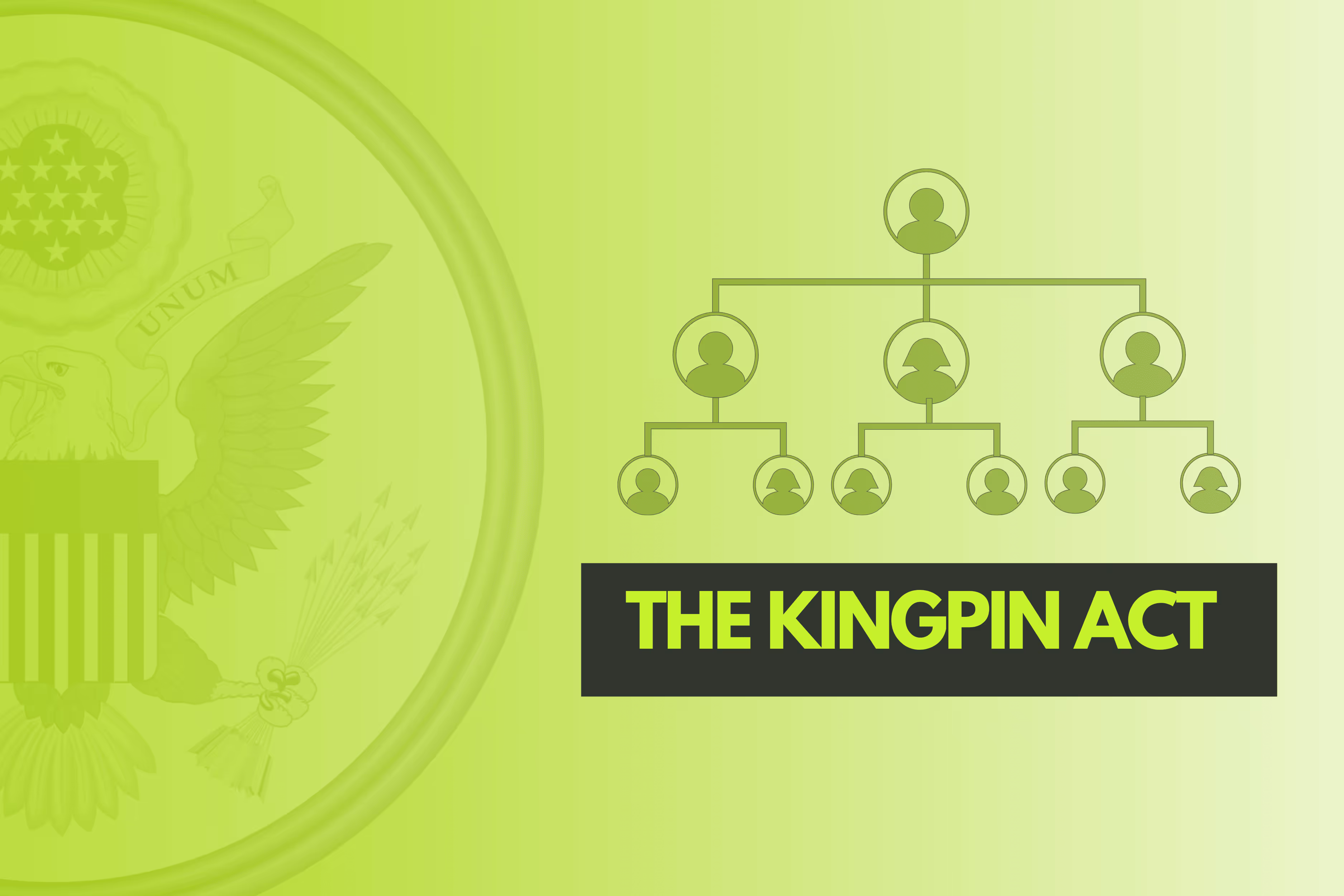
The Kingpin Act and Its Impact on Sanctions Compliance
The Kingpin Act is crucial legislation that organizations worldwide within the Western financial system must adhere to. Failure to comply may lead to tremendous financial penalties and restrictions on business activities. In this report by sanctions.io, we analyze its implications for sanctions compliance and its significance for your business.
And it's important to remember this: In 2024, Kingpin Act sanctions violations are as high-profile as ever. This report also dives into a recent case study involving a Swiss bank - resulting in a $3.7 million OFAC penalty.
But first, we'll provide a quick overview of the Act.
Understanding the Kingpin Act: What Is It?
The Foreign Narcotics Kingpin Designation Act, better known as the Kingpin Act, is a pivotal piece of legislation the US government enacted in 1999.
Its origins can be traced back to the rise of powerful drug cartels in Colombia during the 1980s and 1990s, particularly the notorious Cali cartel. In 1995, President Bill Clinton used Executive Order 12978 to target and isolate members of the cartel - planting a seed that would eventually become the Kingpin Act.
Its primary aim is to combat international drug trafficking by targeting narcotics traffickers and their associated organizations.
Under this legislation, the President of the United States may designate individuals and entities as Significant Foreign Narcotics Traffickers, subjecting them to strict economic sanctions.
Kingpin Act Sanctions Explained
We now know that the Act is. But how does it relate to sanctions? It works like this:
- The US President designates individuals/entities as Significant Foreign Narcotics Traffickers
- The US Treasury's OFAC arm enforces the sanctions
- Asset freezes are likely to occur
- Prohibitions on financial dealings with US entities
As mentioned above, OFAC is the Office of Foreign Assets Control, which enforces it. It adds the individuals and entities designated as Significant Foreign Narcotics Traffickers to its Specially Designated Nationals and Blocked Persons (SDN List).
Therefore, it's important to remember that when your organization performs sanctions screening on customers and business partners, screening against the SDN List is a fundamental facet of Kingpin Act compliance.
And good news: sanctions.io's standard subscription covers the SDN List.
2024 Case Study: EFG International
We now know the Kingpin Act and the OFAC list your business needs to screen customers against in your compliance processes. But what happens to organizations that allow this vital process to slip through the cracks?
To illustrate this, we don't need to step too far back in time. In March 2024, OFAC announced it had slapped Swiss Private Bank, EFG, with a $3.7 million penalty to settle allegations it held and invested securities for sanctioned individuals.
This case involves apparent violations of multiple sanctions programs administered by OFAC - not just Significant Foreign Narcotics Traffickers appearing on the SDN List.
To read the Enforcement Release, click here (PDF format).
But what apparent violations took place in terms of blacklisted narcotics traffickers? According to OFAC, in 2009, EFG's Singapore branch opened an investment account for a Chinese national who, in 2014, was designated as a Specially Designated Narcotics Trafficking Kingpin (SDNTK).
Despite implementing internal restrictions on the account upon designation, EFG Singapore processed 141 securities transactions conducted by US securities firms totaling $468,615 over four years.
Throughout this period, the institution also neglected to notify its US custodian or the US securities firms conducting transactions with the omnibus account about the status of the designated client.
OFAC also added that after uncovering this oversight in 2018, EFG Singapore reinforced its control measures and notified the relevant US securities firms about the underlying SDNTK interest.
Lessons Learned
A critical takeaway from this case is the heightened compliance risk faced by large businesses with complex and global subsidiaries. In sanctions.io's 2023 roundup of sanctions regulatory penalties, subsidiary challenges are a common theme.
A tough nut to crack with OFAC compliance is how to screen against sanctions lists efficiently within complex company structures and correspondent banking relationships.
Recommended reading - 2023 in Review: Noteworthy Sanctions List Violation Penalties
Why All Companies Worldwide Must Comply With the Kingpin Act
While the Kingpin Act originates from the US, its reach extends globally, compelling all companies and organizations worldwide seeking to operate seamlessly within the Western financial system to adhere to it.
But how so?
Since 2017, OFAC has asserted broader jurisdictional reach over non-US entities engaging in transactions without direct contact with the US (other than making payments in US dollars). This shift has resulted in significant fines and restrictions on business activities - such as the CSE Global case (a company based in Singapore).
Access to US dollar transactions is likely essential for the businesses and organizations represented by the readers of this article.
Therefore, it is essential to comply with the Kingpin Act by performing checks for individuals designated Significant Foreign Narcotics Traffickers by performing SDN List screening.
Final Thoughts and How sanctions.io Supports Kingpin Act Sanctions Compliance
The Kingpin Act is legislation that the US government takes extremely seriously. Why? Narcotic kingpins have the potential to undermine public safety and national security in the US.
In 2024, as illustrated by a $3.7 million OFAC penalty to EFG for performing transactions for a Chinese individual identified as a Significant Foreign Narcotics Trafficker, adherence to the Act should be deemed crucial for all companies, regardless of their global location.
Does your business need help efficiently screening your customers and stakeholders against OFAC's SDN List to comply with the Kingpin Act?
sanctions.io is a highly reliable and cost-effective solution for sanctions screening. AI-powered and with an enterprise-grade API with 99.995+% uptime are reasons why customers globally trust us with their sanctions screening needs. To learn more:
We also encourage you to take advantage of our free 7-day trial (no credit card is required).



